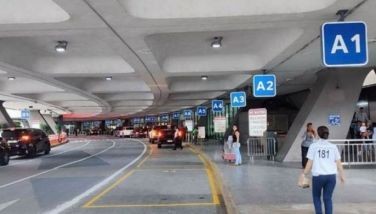'If not for EDSA, communists would have ruled Phl'
MANILA, Philippines - Were it not for the bloodless EDSA People Power revolution in 1986, the communists could have ruled the country following the fall of the late dictator Ferdinand Marcos.
This was according to Brig. Gen. Jose Mabanta Jr., spokesman of the Armed Forces of the Philippines (AFP), in reply to the statement from the communist New People’s Army (NPA) rebels that actively took part in the bloodless uprising in the hope that the peaceful revolution would bring significant political and social changes in the country.
“Some of them (NPA rebels) might have joined Edsa I but with a different objective in mind and they failed, because it was peaceful. So they were not able to carry out their violent objective,” Mabanta said.
Mabanta stressed nobody could claim credit for the peaceful uprising but the entire nation.
He said the event was an epitome of Filipino’s bayanihan (collective) spirit.
“What happened was a manifestation of spontaneous unity between compatriots, employing peace in a battle for peace and enduring freedom,” Mabanta said.
He added the AFP has been one with the Filipino nation in supporting the struggle for peaceful change.
He said the peaceful political transition 25 years ago only showcased the AFP’s service and the loyalty to the state by siding with the people during those four critical days.
“Amidst the revolution, military tanks and armored personnel carriers (APCs) did not proceed to attack upon the people’s imploration and instead sympathized with them for a common cause,” Mabanta said.
NPA commander Jorge “Ka Oris” Madlos, spokesman of the National Democratic Front of the Philippines-Mindanao said the people’s aspirations for fundamental social change have yet to be realized since the bloodless revolt occurred.
”Twenty-five years after Edsa, however, no fundamental social change has taken place. Terror and chronic poverty under the post-Marcos puppet regimes continue to hound the Filipino people,” Madlos said in a statement.
Madlos though admitted the Edsa uprising was a triumph of the Filipino people who toppled the Marcos dictatorship through peaceful struggle.
Madlos lamented that 25 years after Edsa, graft and corruption are more deeply embedded than ever and bureaucrat-capitalism is more deeply entrenched.
This was highlighted during the nine-year administration of former President Gloria Macapagal-Arroyo and her allies, he said.
Mabanta, however, pointed out that progress and development can only be fully attained when there is already genuine peace.
“Let us be an inspiration to each other as we work together to champion the shared goal of continuously strengthening peace,” Mabanta said.
Philippine National Police (PNP) chief Director General Raul Bacalzo attended yesterday’s ceremony representing the police force.
Bacalzo led some 1,000 police officials and personnel in marching from the PNP headquarters at Camp Crame to meet their counterparts from the AFP across EDSA to commemorate the “salubong” event that merged the key players of the Edsa revolution at the historic avenue.
Bacalzo recalled he was a constabulary captain during the 1986 revolution.
“I joined (the forces) in Camp Crame with some junior officers from the Metrocom. I was designated near the Aviation Group office, and there was a euphoric sense of freedom while everybody was flashing the ‘L’ (Laban) sign with their hands.” – With Edith Regalado, Cecille Suerte Felipe
- Latest
- Trending

































